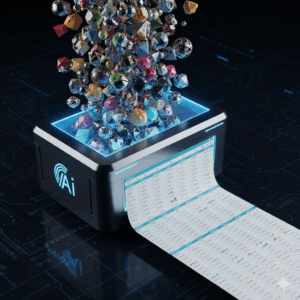
For decades, spreadsheets have been the silent workhorse of businesses, meticulously organizing data in a familiar grid of rows and columns. But a quiet revolution is underway. Artificial intelligence (AI) is transforming this foundational tool into a dynamic and intelligent partner, automating tedious tasks and unlocking new levels of efficiency.
The integration of AI into spreadsheet software like Microsoft Excel and Google Sheets is not just an incremental update; it’s a fundamental shift in how we interact with data. AI is making spreadsheets smarter and faster, automating repetitive chores such as data entry, formatting, and basic calculations. This frees up employees to focus on more strategic and complex problems. In fact, according to research from Gartner, by 2024, 75% of enterprises will shift from piloting to operationalizing AI, driving a 5X increase in streaming data and analytics infrastructures. This shift indicates a massive move toward the kind of automation AI brings to everyday tools.

One of the most significant impacts of AI in spreadsheets is the simplification of complex formulas. Instead of wrestling with intricate syntax, users can now often describe what they want to achieve in plain language, and the AI will generate the correct formula. For instance, Microsoft’s introduction of features like “Formulas by Example” in Excel demonstrates this trend, where the AI suggests formulas based on user patterns. This democratization of data analysis means that employees without deep technical expertise can now leverage the full power of spreadsheets.
Furthermore, AI is drastically improving data accuracy. Manual data entry is notoriously prone to errors, which can lead to flawed conclusions and poor business decisions. According to a report highlighted by business analytics firm Fivetran, up to 20% of a data scientist’s time can be spent just cleaning and correcting data, a task AI can significantly streamline. AI minimizes these mistakes by automating data entry and checking for inconsistencies, ensuring the data is reliable. Some AI tools can even automatically clean and analyze data with a single click, detecting and correcting errors, removing duplicates, and standardizing formats.

The benefits are clear: increased productivity, fewer errors, and more confident, data-driven decisions. As AI becomes more deeply embedded in these everyday tools, it will continue to empower businesses to work faster and smarter, turning the humble spreadsheet into a powerhouse of automated insights.


